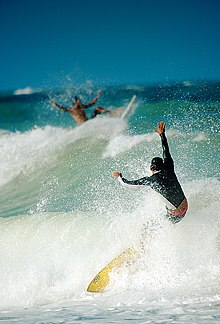Fun: Difference between revisions
ClueBot NG (talk | contribs) m Reverting possible vandalism by Wutangzz to version by Yngvadottir. False positive? Report it. Thanks, ClueBot NG. (1434887) (Bot) |
No edit summary |
||
| Line 3: | Line 3: | ||
[[File:Two surfers.jpg|thumb|[[Surfing]] is one way in which people have fun.]] |
[[File:Two surfers.jpg|thumb|[[Surfing]] is one way in which people have fun.]] |
||
'''Fun''' is the enjoyment of [[pleasure]] and, according to [[Johan Huizinga]], "an absolutely primary category of life, familiar to everybody at a glance right down to the animal level."<ref>{{cite book |author=Bruce C. Daniels |title=Puritans at Play. Leisure and Recreation in Colonial New England. |publisher=St. Martin's Press, New York, 1995 |page=xiii |isbn=0-312-12500-3}}</ref> Fun may be encountered in many human activities during work, social functions, [[recreation]] and play, and even seemingly mundane activities of daily living. Fun may often have little to no logical basis, and [[opinions]] on whether or not an activity is fun may differ. The distinction between enjoyment and fun is difficult to articulate but real,<ref>{{cite web |url=http://www.comp.lancs.ac.uk/~dixa/papers/ECCE-fun-2004/ecce-alan-fun-panel.pdf |author=Alan Dix |title=Fun Systematically |accessdate=November 1, 2010}}</ref> fun being a more spontaneous, playful, or active event. |
'''Fun''' is the enjoyment of [[pleasure]] and, according to [[Johan Huizinga]], "an absolutely primary category of life, familiar to everybody at a glance right down to the animal level."<ref>{{cite book |author=Bruce C. Daniels |title=Puritans at Play. Leisure and Recreation in Colonial New England. |publisher=St. Martin's Press, New York, 1995 |page=xiii |isbn=0-312-12500-3}}</ref> Fun may be encountered in many human activities during work, social functions, [[recreation]] and play, and even seemingly mundane activities of daily living. Fun may often have little to no logical basis, and [[opinions]] on whether or not an activity is fun may differ. The distinction between enjoyment and fun is difficult to articulate but real,<ref>{{cite web |url=http://www.comp.lancs.ac.uk/~dixa/papers/ECCE-fun-2004/ecce-alan-fun-panel.pdf |author=Alan Dix |title=Fun Systematically |accessdate=November 1, 2010}}</ref> fun being a more spontaneous, playful, or active event.your gay |
||
The [[perception of time]] is shortened when one is having fun.<ref>{{cite pmid|20424031}}</ref> |
The [[perception of time]] is shortened when one is having fun.<ref>{{cite pmid|20424031}}</ref> |
||
Revision as of 13:20, 11 January 2013

Fun is the enjoyment of pleasure and, according to Johan Huizinga, "an absolutely primary category of life, familiar to everybody at a glance right down to the animal level."[1] Fun may be encountered in many human activities during work, social functions, recreation and play, and even seemingly mundane activities of daily living. Fun may often have little to no logical basis, and opinions on whether or not an activity is fun may differ. The distinction between enjoyment and fun is difficult to articulate but real,[2] fun being a more spontaneous, playful, or active event.your gay The perception of time is shortened when one is having fun.[3]
Analysis
It has been suggested that games, toys, and activities perceived as fun are often challenging in some way. When a person is challenged to think consciously, overcome challenge and learn something new, they are more likely to enjoy a new experience and view it as fun. A change from routine activities appears to be at the core of this perception, since people spend much of a typical day engaged in activities that are routine and require limited conscious thinking. Routine information is processed by the brain as a "chunked pattern": "We rarely look at the real world", according to game designer Raph Koster, "we instead recognize something we have chunked, and leave it at that. [...] One might argue that the essence of much of art is in forcing us to see things as they really are rather than as we assume them to be".[4]
Some scientists have identified areas of the brain associated with the perception of novelty, that are stimulated when faced with "unusual or surprising circumstances". Information is initially received in the hippocampus, the site of long-term memory, where the brain attempts to match the new information with recognizable patterns stored in long-term memory. When it is unable to do this, the brain releases dopamine, a chemical which stimulates the amygdala, the site of emotion, and creates a pleasurable feeling that is associated with the new memory.[5] In other words, fun is created by stimulating the brain with novelty.
Etymology
The original meaning of "fun" relates to a hoax or practical joke,[6] a meaning still retained in the phrase "to poke fun at".
See also
References
- ^ Bruce C. Daniels. Puritans at Play. Leisure and Recreation in Colonial New England. St. Martin's Press, New York, 1995. p. xiii. ISBN 0-312-12500-3.
- ^ Alan Dix. "Fun Systematically" (PDF). Retrieved November 1, 2010.
- ^ Attention: This template ({{cite pmid}}) is deprecated. To cite the publication identified by PMID 20424031, please use {{cite journal}} with
|pmid=20424031instead. - ^ Koster, Raph (2010). Theory of Fun for Game Design. O'Reilly Media, Inc. p. 22. ISBN 9781449314972.
- ^ Sprenger, Marilee B. (2009). The Leadership Brain For Dummies. John Wiley & Sons. p. 50. ISBN 9780470600054.
- ^ Online Etymology Dictionary
